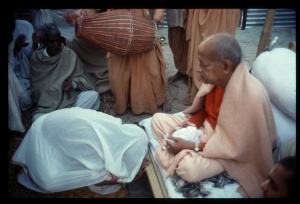CC Madhya 2.9: Difference between revisions
m (1 revision(s)) |
(Vanibot #0054 edit - transform synonyms into clickable links, which search similar occurrences) |
||
| (One intermediate revision by one other user not shown) | |||
| Line 1: | Line 1: | ||
{{ | [[Category:Sri Caitanya-caritamrta - Madhya-lila Chapter 02|C009]] | ||
<div style="float:left">'''[[Sri Caitanya-caritamrta|Śrī Caitanya-caritāmṛta]] - [[CC Madhya|Madhya-līlā]] - [[CC Madhya 2|Chapter 2: The Ecstatic Manifestations of Lord Śrī Caitanya Mahāprabhu]]'''</div> | |||
<div style="float:right">[[File:Go-previous.png|link=CC Madhya 2.8|Madhya-līlā 2.8]] '''[[CC Madhya 2.8|Madhya-līlā 2.8]] - [[CC Madhya 2.10|Madhya-līlā 2.10]]''' [[File:Go-next.png|link=CC Madhya 2.10|Madhya-līlā 2.10]]</div> | |||
{{CompareVersions|CC|Madhya 2.9|CC 1975|CC 1996}} | |||
{{RandomImage}} | |||
==== TEXT 9 ==== | ==== TEXT 9 ==== | ||
<div | <div class="verse"> | ||
caṭaka parvata dekhi’ ‘govardhana’ bhrame | :caṭaka parvata dekhi’ ‘govardhana’ bhrame | ||
dhāñā cale ārta-nāda kariyā krandane | :dhāñā cale ārta-nāda kariyā krandane | ||
</div> | </div> | ||
| Line 12: | Line 16: | ||
==== SYNONYMS ==== | ==== SYNONYMS ==== | ||
<div | <div class="synonyms"> | ||
caṭaka | ''[//vanipedia.org/wiki/Special:VaniSearch?s=caṭaka&tab=syno_o&ds=1 caṭaka] [//vanipedia.org/wiki/Special:VaniSearch?s=parvata&tab=syno_o&ds=1 parvata]'' — the sand dunes; ''[//vanipedia.org/wiki/Special:VaniSearch?s=dekhi’&tab=syno_o&ds=1 dekhi’]'' — seeing; ''[//vanipedia.org/wiki/Special:VaniSearch?s=govardhana&tab=syno_o&ds=1 govardhana]'' — Govardhana Hill in Vṛndāvana; ''[//vanipedia.org/wiki/Special:VaniSearch?s=bhrame&tab=syno_o&ds=1 bhrame]'' — mistakes; ''[//vanipedia.org/wiki/Special:VaniSearch?s=dhāñā&tab=syno_o&ds=1 dhāñā]'' — running; ''[//vanipedia.org/wiki/Special:VaniSearch?s=cale&tab=syno_o&ds=1 cale]'' — goes; ''[//vanipedia.org/wiki/Special:VaniSearch?s=ārta&tab=syno_o&ds=1 ārta]-[//vanipedia.org/wiki/Special:VaniSearch?s=nāda&tab=syno_o&ds=1 nāda]'' — wail; ''[//vanipedia.org/wiki/Special:VaniSearch?s=kariyā&tab=syno_o&ds=1 kariyā]'' — making; ''[//vanipedia.org/wiki/Special:VaniSearch?s=krandane&tab=syno_o&ds=1 krandane]'' — cries. | ||
</div> | </div> | ||
| Line 19: | Line 23: | ||
==== TRANSLATION ==== | ==== TRANSLATION ==== | ||
<div | <div class="translation"> | ||
Śrī Caitanya Mahāprabhu would also run very fast across the sand dunes, mistaking them for Govardhana. As He ran, He would wail and cry loudly. | Śrī Caitanya Mahāprabhu would also run very fast across the sand dunes, mistaking them for Govardhana. As He ran, He would wail and cry loudly. | ||
</div> | </div> | ||
| Line 26: | Line 30: | ||
==== PURPORT ==== | ==== PURPORT ==== | ||
<div | <div class="purport"> | ||
Because of the winds of the sea, sometimes the sand would form dunes. Such sand dunes are called caṭaka parvata. Instead of seeing these sand dunes simply as hills of sand, the Lord would take them to be Govardhana Hill. Sometimes He would run toward these dunes at high speed, crying very loudly, expressing the state of mind exhibited by Rādhārāṇī. Thus Caitanya Mahāprabhu was absorbed in thoughts of Kṛṣṇa and His pastimes. His state of mind brought Him the atmosphere of Vṛndāvana and Govardhana Hill, and thus He enjoyed the transcendental bliss of separation and meeting. | Because of the winds of the sea, sometimes the sand would form dunes. Such sand dunes are called ''caṭaka parvata''. Instead of seeing these sand dunes simply as hills of sand, the Lord would take them to be Govardhana Hill. Sometimes He would run toward these dunes at high speed, crying very loudly, expressing the state of mind exhibited by Rādhārāṇī. Thus Caitanya Mahāprabhu was absorbed in thoughts of Kṛṣṇa and His pastimes. His state of mind brought Him the atmosphere of Vṛndāvana and Govardhana Hill, and thus He enjoyed the transcendental bliss of separation and meeting. | ||
</div> | </div> | ||
__NOTOC__ | |||
<div style="float:right; clear:both;">[[File:Go-previous.png|link=CC Madhya 2.8|Madhya-līlā 2.8]] '''[[CC Madhya 2.8|Madhya-līlā 2.8]] - [[CC Madhya 2.10|Madhya-līlā 2.10]]''' [[File:Go-next.png|link=CC Madhya 2.10|Madhya-līlā 2.10]]</div> | |||
__NOTOC__ | |||
__NOEDITSECTION__ | |||
Latest revision as of 22:35, 19 February 2024

A.C. Bhaktivedanta Swami Prabhupada
TEXT 9
- caṭaka parvata dekhi’ ‘govardhana’ bhrame
- dhāñā cale ārta-nāda kariyā krandane
SYNONYMS
caṭaka parvata — the sand dunes; dekhi’ — seeing; govardhana — Govardhana Hill in Vṛndāvana; bhrame — mistakes; dhāñā — running; cale — goes; ārta-nāda — wail; kariyā — making; krandane — cries.
TRANSLATION
Śrī Caitanya Mahāprabhu would also run very fast across the sand dunes, mistaking them for Govardhana. As He ran, He would wail and cry loudly.
PURPORT
Because of the winds of the sea, sometimes the sand would form dunes. Such sand dunes are called caṭaka parvata. Instead of seeing these sand dunes simply as hills of sand, the Lord would take them to be Govardhana Hill. Sometimes He would run toward these dunes at high speed, crying very loudly, expressing the state of mind exhibited by Rādhārāṇī. Thus Caitanya Mahāprabhu was absorbed in thoughts of Kṛṣṇa and His pastimes. His state of mind brought Him the atmosphere of Vṛndāvana and Govardhana Hill, and thus He enjoyed the transcendental bliss of separation and meeting.